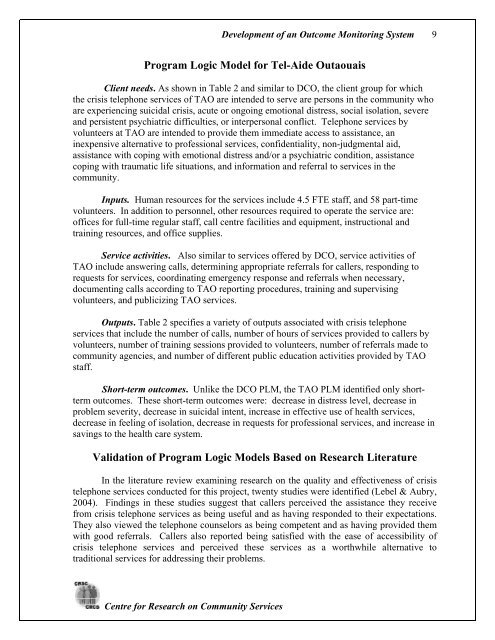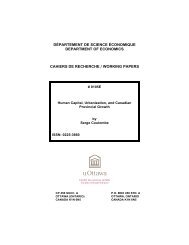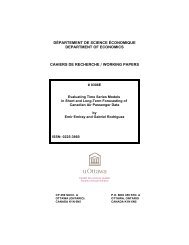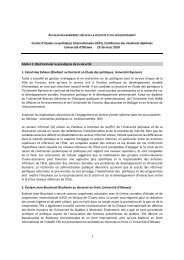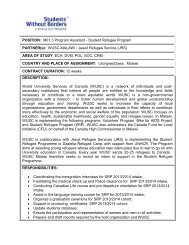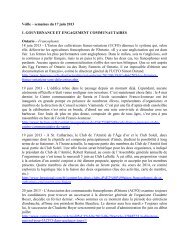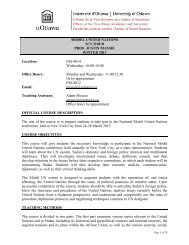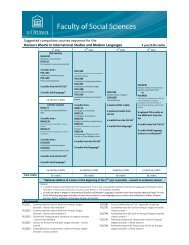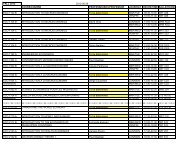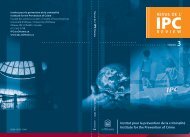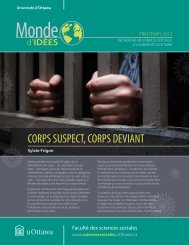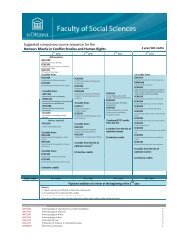Development of an outcome monitoring system for crisis telephone ...
Development of an outcome monitoring system for crisis telephone ...
Development of an outcome monitoring system for crisis telephone ...
You also want an ePaper? Increase the reach of your titles
YUMPU automatically turns print PDFs into web optimized ePapers that Google loves.
<strong>Development</strong> <strong>of</strong> <strong>an</strong> Outcome Monitoring System<br />
9<br />
Program Logic Model <strong>for</strong> Tel-Aide Outaouais<br />
Client needs. As shown in Table 2 <strong>an</strong>d similar to DCO, the client group <strong>for</strong> which<br />
the <strong>crisis</strong> <strong>telephone</strong> services <strong>of</strong> TAO are intended to serve are persons in the community who<br />
are experiencing suicidal <strong>crisis</strong>, acute or ongoing emotional distress, social isolation, severe<br />
<strong>an</strong>d persistent psychiatric difficulties, or interpersonal conflict. Telephone services by<br />
volunteers at TAO are intended to provide them immediate access to assist<strong>an</strong>ce, <strong>an</strong><br />
inexpensive alternative to pr<strong>of</strong>essional services, confidentiality, non-judgmental aid,<br />
assist<strong>an</strong>ce with coping with emotional distress <strong>an</strong>d/or a psychiatric condition, assist<strong>an</strong>ce<br />
coping with traumatic life situations, <strong>an</strong>d in<strong>for</strong>mation <strong>an</strong>d referral to services in the<br />
community.<br />
Inputs. Hum<strong>an</strong> resources <strong>for</strong> the services include 4.5 FTE staff, <strong>an</strong>d 58 part-time<br />
volunteers. In addition to personnel, other resources required to operate the service are:<br />
<strong>of</strong>fices <strong>for</strong> full-time regular staff, call centre facilities <strong>an</strong>d equipment, instructional <strong>an</strong>d<br />
training resources, <strong>an</strong>d <strong>of</strong>fice supplies.<br />
Service activities. Also similar to services <strong>of</strong>fered by DCO, service activities <strong>of</strong><br />
TAO include <strong>an</strong>swering calls, determining appropriate referrals <strong>for</strong> callers, responding to<br />
requests <strong>for</strong> services, coordinating emergency response <strong>an</strong>d referrals when necessary,<br />
documenting calls according to TAO reporting procedures, training <strong>an</strong>d supervising<br />
volunteers, <strong>an</strong>d publicizing TAO services.<br />
Outputs. Table 2 specifies a variety <strong>of</strong> outputs associated with <strong>crisis</strong> <strong>telephone</strong><br />
services that include the number <strong>of</strong> calls, number <strong>of</strong> hours <strong>of</strong> services provided to callers by<br />
volunteers, number <strong>of</strong> training sessions provided to volunteers, number <strong>of</strong> referrals made to<br />
community agencies, <strong>an</strong>d number <strong>of</strong> different public education activities provided by TAO<br />
staff.<br />
Short-term <strong>outcome</strong>s. Unlike the DCO PLM, the TAO PLM identified only shortterm<br />
<strong>outcome</strong>s. These short-term <strong>outcome</strong>s were: decrease in distress level, decrease in<br />
problem severity, decrease in suicidal intent, increase in effective use <strong>of</strong> health services,<br />
decrease in feeling <strong>of</strong> isolation, decrease in requests <strong>for</strong> pr<strong>of</strong>essional services, <strong>an</strong>d increase in<br />
savings to the health care <strong>system</strong>.<br />
Validation <strong>of</strong> Program Logic Models Based on Research Literature<br />
In the literature review examining research on the quality <strong>an</strong>d effectiveness <strong>of</strong> <strong>crisis</strong><br />
<strong>telephone</strong> services conducted <strong>for</strong> this project, twenty studies were identified (Lebel & Aubry,<br />
2004). Findings in these studies suggest that callers perceived the assist<strong>an</strong>ce they receive<br />
from <strong>crisis</strong> <strong>telephone</strong> services as being useful <strong>an</strong>d as having responded to their expectations.<br />
They also viewed the <strong>telephone</strong> counselors as being competent <strong>an</strong>d as having provided them<br />
with good referrals. Callers also reported being satisfied with the ease <strong>of</strong> accessibility <strong>of</strong><br />
<strong>crisis</strong> <strong>telephone</strong> services <strong>an</strong>d perceived these services as a worthwhile alternative to<br />
traditional services <strong>for</strong> addressing their problems.<br />
Centre <strong>for</strong> Research on Community Services


